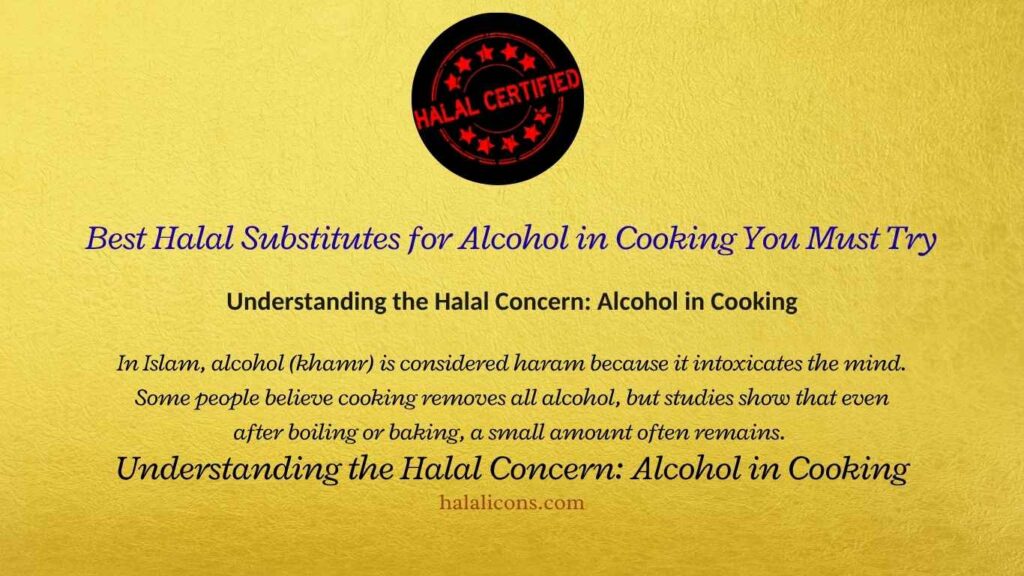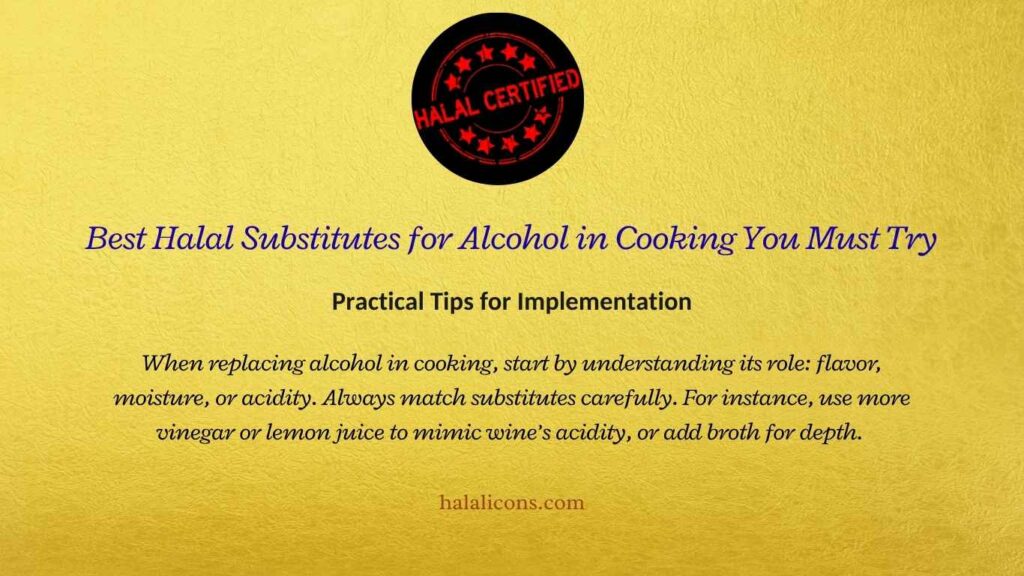Cooking delicious meals that stay true to halal principles can sometimes feel tricky—especially when recipes call for wine, beer, or other alcoholic ingredients. Many Muslim home cooks wonder if using these is halal and what they can use instead. That’s where halal substitutes for alcohol in cooking come in.
These practical, alcohol-free alternatives help you achieve rich flavors, balance, and texture—without compromising your beliefs. From replacing red wine in sauces to finding a halal alternative to beer in batter, there are plenty of options that keep your dishes both tasty and permissible.
Understanding the Halal Concern: Alcohol in Cooking

In Islam, alcohol (khamr) is considered haram because it intoxicates the mind. Some people believe cooking removes all alcohol, but studies show that even after boiling or baking, a small amount often remains.
That’s why many Muslims avoid dishes prepared with wine, beer, or liqueurs—even if used only for flavor. Cooking alcohol halal discussions often focus on whether trace amounts make food impermissible. To stay safe, halal cooking experts recommend using alcohol-free substitutes instead.
You might also like: Is Starburst Halal or Haram?
Common Uses of Alcohol in Cooking
Alcohol appears in many global cuisines. Chefs often use wine to deglaze pans and add depth to sauces, beer for batter or marinades, and liqueurs for desserts like tiramisu or fruitcakes. Asian recipes may include mirin or sake for sweetness and aroma.
But these ingredients pose halal concerns since they contain alcohol. Understanding how and why alcohol is used helps you find proper halal substitutes for alcohol in cooking.
Why Substitutes Matter: Flavor, Texture & Safety
Alcohol in recipes isn’t just for drinking—it changes texture, aroma, and acidity. Red wine adds richness to sauces, beer gives batters a crisp finish, and liqueurs enhance desserts. When you skip these without proper halal substitutes, food can taste flat or overly sweet.
Using halal-friendly alternatives like white grape juice, vinegar, or non-alcoholic cooking wine helps maintain flavor balance.
Main Substitution Strategies
1. Wine Substitutes
- White grape juice + lemon for white wine flavor
- Red grape juice + vinegar for red wine dishes
2. Beer Substitutes
- Sparkling water or broth + malt extract for batters or marinades
3. Liqueur Substitutes
- Fruit juice + zest or vanilla for desserts
4. Mirin or Sake Substitutes
- Apple juice + rice vinegar or sugar for Asian-style dishes
Each alternative mimics the acidity and depth of alcohol without being haram.
Practical Tips for Implementation

When replacing alcohol in cooking, start by understanding its role: flavor, moisture, or acidity. Always match substitutes carefully. For instance, use more vinegar or lemon juice to mimic wine’s acidity, or add broth for depth.
In batter recipes, sparkling water replaces beer to create a light texture. Check every ingredient label for halal certification, especially with non-alcoholic wine or extracts.
You might also like: Are Cheetos Halal?
Debunking Common Myths & FAQ Overview
Many believe that alcohol completely evaporates when cooked, but that’s a myth—some residue usually remains. Another misconception is that small amounts of alcohol are halal if used only for flavor. However, most Islamic scholars advise avoiding it altogether. The safest choice is to stick with halal substitutes for alcohol in cooking, like fruit juices or vinegars.
Recipe-Friendly Substitution Table
| Alcohol Used | Halal Substitute | Best Used In |
| Red wine | Red grape juice + 1 tbsp vinegar | Sauces, stews |
| White wine | White grape juice + lemon juice | Cream sauces, pasta |
| Beer | Sparkling water + malt extract or broth | Batters, marinades |
| Rum | Pineapple juice + vanilla essence | Desserts |
| Liqueurs | Fruit syrup or halal-certified extracts | Cakes, sweets |
| Mirin | Apple juice + rice vinegar | Asian dishes |
These swaps keep your recipes flavorful and halal-compliant.
Final Thoughts
Cooking halal doesn’t mean giving up flavor or creativity. By using the right halal substitutes for alcohol in cooking, you can prepare tasty sauces, crisp batters, and sweet desserts without worry. Always read ingredient labels, look for halal certification, and experiment until it feels just right. With a few simple adjustments, you can cook confidently—staying true to both taste and faith.
FAQs
1. Why is alcohol not allowed in halal cooking?
Alcohol is considered haram in Islam because it intoxicates, so any food cooked with it is avoided.
2. Does alcohol completely burn off during cooking?
No. Even after heating, trace amounts of alcohol can remain in food.
3. Can I use non-alcoholic wine or beer in halal recipes?
Not always. Some “non-alcoholic” drinks still contain small traces of alcohol, so check halal certification.
4. What’s a good halal substitute for red wine in sauces?
Red grape juice mixed with vinegar gives a similar tangy, rich flavor.
5. How do I replace beer in batter?
Use sparkling water or broth for the same airy texture.
6. Can I use vinegar as a halal substitute for wine?
Yes, vinegar adds acidity and enhances flavor just like wine would.
7. What can replace rum in desserts?
Pineapple juice or apple juice with vanilla essence mimics rum’s sweetness.
8. Are all cooking extracts halal?
No. Some extracts are alcohol–based, so always check the halal certification label.
9. What’s a halal alternative to mirin or sake?
Mix apple juice with rice vinegar or sugar for a similar sweetness.
10. Is it haram to eat food cooked with alcohol if you didn’t know?
If consumed unknowingly, you’re not at fault, but once aware, it should be avoided in the future.
Qamar Ul Haq is an Islamic historian and writer with a passion for uncovering the rich heritage of Muslim civilizations. Through in-depth research and storytelling, He brings to life the achievements, struggles, and contributions of the Ummah throughout history.